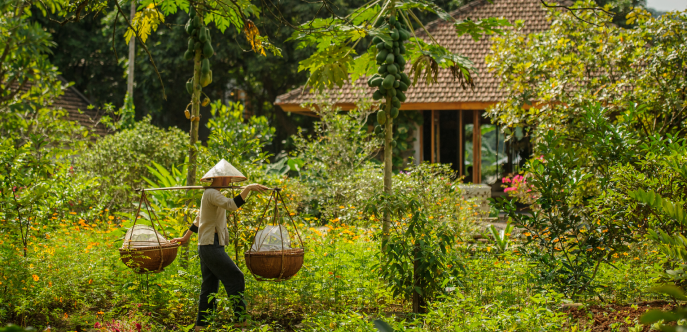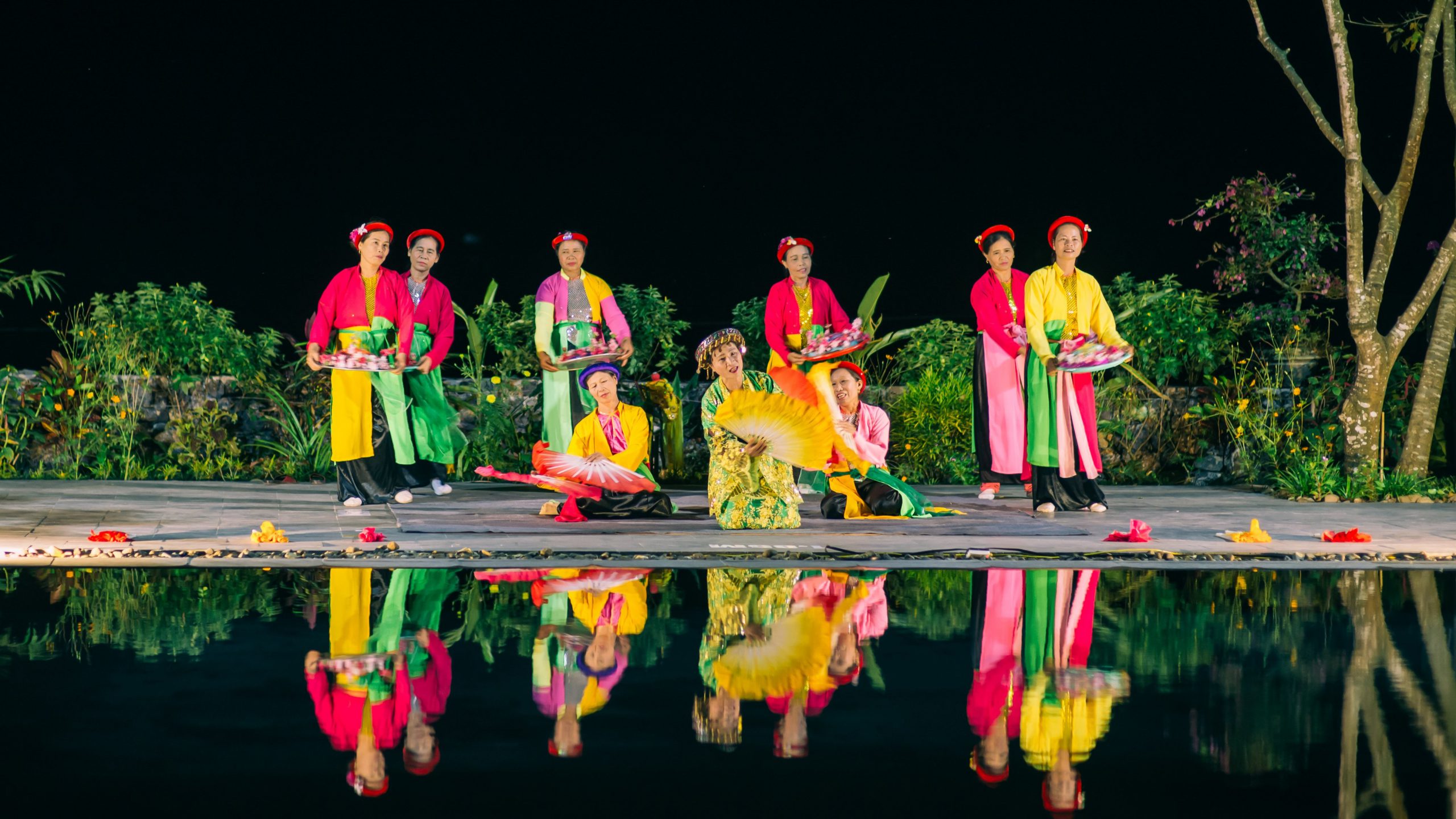

Location
- Surrounded by unspoilt nature of mountains and rice fields
- Secluded area, far away from the busy center
- Located in the area of local residents
- Touristic sites easily accessible
Building process
- Second-hand and local construction materials to reduce the negative impact on the environment.
- Use of environmentally friendly materials such as stone, wood, bamboo...
Architecture
- Preserving the traditional architecture of a one-story house typical in Northern Vietnam
- Open space design to make the most of natural elements (light, wind...)
- Internal & external natural ventilation (double roof ventilation, large windows...)
- Big trees planted around the ecolodge to reduce heating of accommodations
Environment
- No cutting down of trees or destruction of rice fields
- No impact on wildlife habitat

General

- Training courses related to sustainable development activities for employees.
- Reminder boards, instructional documents on environmental protection for employees.
- Establish operating procedures to ensure environmental safety
- Develop energy monitoring systems.
- Installation of energy management equipment.
- Implement "green shopping" policy: using natural products, locally produced...
- Regulations on waste classification and energy saving.
- Assigning management tasks and saving energy for employees.
- Encouraging and rewarding employees for giving energy saving measures.
- Record the amount of waste of each department
- Regularly record and monitor energy consumption.
- Analyze data to find ways to improve and control impacts from the external environment.
Details

Energy conservation

- Training courses related to sustainable development activities for employees.
- Reminder boards, instructional documents on environmental protection for employees.
- Establish operating procedures to ensure environmental safety
- Develop energy monitoring systems.
Details

Water conservation
- Collect water from opened bottles to reuse for plants
- Unopened bottles: record monthly & no replacing
- Use powder cleaning agent to clean carpet instead of water or steam
- Choose native and drought tolerant plants to save irrigation water
- Water plants in the garden only in the morning and late afternoon to avoid rapid evaporation
- Water the plants with a drip irrigation system
- Install appropriate filtration system to recycle water and reduce water consumption
- Checking old equipment and replacing / renovating quickly
- Turn off taps and shower heads when not in use
- Only run dishwasher and washing machine at full load
- Self-service drinking water station
- Serve / refill water only upon customers’ request
- Provide appropriate pots to safely wash vegetables & raw foods and save water
Details

Waste & recycling
- Use of ceramic containers for body and hair care products instead of single-use plastic ones.
- Single-use bathroom items are available upon request.
- Purchase of products in a few large packages instead of several small ones.
- Use of recyclable/biodegradable packaging material to replace plastic.
- Buy food based on expected number of guests
- “First in, first out” policy
- Regular check on food expiry date
- Installation of a fat separator in the restaurant to avoid blockages and pollution incidents relating to oil and grease
- Scanning passport photocopies (tablet or smartphone)
- Use of email to confirm/send bookings bills or invoices
- Print double-sided paper, if possible
- Have a separated and safe place for printing inks, batteries, light bulbs and other hazardous chemicals
Details

Pollution & solutions

- No smoking in rooms and public spaces
- All services and activities end before midnight
- Use of organic and eco-friendly detergents (vinegar, bio-shampoo, organic body lotion...)
- Use of eco-friendly repellents (lemongrass essential oil and mosquito nets )
- All services and activities end before midnight
- Purchase of seasonal products; avoid buying genetically modified organisms (GMOs)
- Purchase of local products
- Use of eco-friendly products ( made from recycled / natural materials)
- Offer environment-friendly outdoor activities for guests, including walking, bicycling, swimming, canoeing, picnicking, etc.
- Use of compost as a natural soil fertilizer, instead of artificial chemical products
Details

Environment: our collective responsibility

- Inform guests about water & energy saving programs through flyers, restaurant signs etc.
- Encourage guests to use their water bottles instead of plastic ones
- Promote environment activities (Earth Hour, Energy Saving Week,Waste Reduction Week, World Food Day, Tree planting, etc)
- No sales or purchase of articles made from wildlife (e.g. souvenirs made from turtles)
- Inform guests against taking part in activities which harm animals or their habitats
- Participate in restoration of local green areas and tree-planting activities
- Inform guests on local culture, products, services of interest and expected behavior when visiting local communities
- Commit to the protection of children from labor, sexual and other forms of exploitation
Details


At Tam Coc Garden, we always prioritize recruiting locally and provide our staff with labor and insurance contracts in accordance with the law. Every employee is entitled to equal rights in all aspects, no matter their age, ethnicity, or gender.
We make sure to train our staff properly, providing them with all the essential tools for their personal and professional development. In addition, Tam Coc Garden does not employ workers under the age of 18 and is committed to protecting children's rights in all its forms.
Advocacy maintained
- Cleaning staff must regularly check the water pipes in the room to ensure there are no leaks; Turn off the device when not in use.
- Having a technical team to replace and repair damaged equipment promptly.
- Regularly check and maintain the equipment in the hotel.


Tam Coc Garden has been built around old houses of local neighbors.
Before its construction, the area has been carefully researched in advance so as not to affect the surrounding people as well as the surrounding wilderness to preserve all the values of this precious land.
